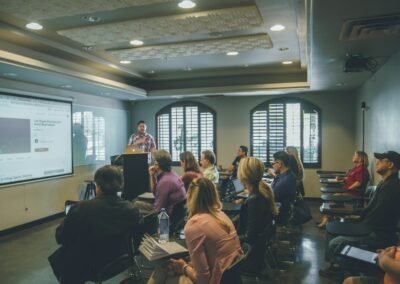Lessons from Sweden: Embracing Digital Literacy and Lifelong Learning
Introduction to Sweden’s Forward-Thinking Policies
The nation’s policies on digital literacy and lifelong learning serve as a model for other countries, including Saudi Arabia and the UAE, as they prepare their populations for the evolving demands of the global job market. Sweden’s commitment to fostering a culture of continuous learning and digital proficiency is evident in its comprehensive strategies that integrate technology into every aspect of education and professional development.
In a world where technological advancements are rapidly transforming industries, the ability to adapt and acquire new skills is crucial. Sweden’s policies emphasize the importance of digital literacy from an early age, ensuring that students are well-equipped to navigate and thrive in a digital world. By embedding digital skills into the national curriculum, Sweden is not only preparing its youth for future jobs but also fostering a society that values innovation and adaptability.
Moreover, Sweden’s approach to lifelong learning extends beyond formal education. The government actively promotes opportunities for adult education and professional development, recognizing that learning is a continuous process that should be accessible to all. This holistic approach ensures that individuals at all stages of their careers can acquire the skills needed to stay relevant in a rapidly changing job market.
Integrating Digital Literacy into Education
One of the cornerstones of Sweden’s success in promoting digital literacy is its integration of technology into the education system. From primary schools to universities, digital tools and resources are used to enhance learning and develop essential skills. This early exposure to technology helps students build a strong foundation in digital literacy, critical thinking, and problem-solving.
In Saudi Arabia and the UAE, adopting similar strategies could significantly boost the digital capabilities of their youth. By incorporating coding, data analysis, and digital content creation into the curriculum, these countries can prepare students for the demands of future jobs. Furthermore, providing access to the latest technological tools and resources ensures that students can develop practical skills that are directly applicable in the workforce.
The benefits of integrating digital literacy into education extend beyond individual students. A digitally literate population is better equipped to drive innovation and economic growth, contributing to the overall development of the country. By following Sweden’s example, Saudi Arabia and the UAE can foster a new generation of tech-savvy professionals who are ready to lead in a digital world.
Promoting Lifelong Learning for Workforce Development
Sweden’s policies on lifelong learning highlight the importance of continuous education and professional development in maintaining a competitive workforce. The government offers a wide range of programs and initiatives designed to support adult learners, including online courses, vocational training, and professional certifications. These opportunities enable individuals to update their skills, switch careers, and stay relevant in a rapidly evolving job market.
For business executives and mid-level managers in Riyadh and Dubai, investing in lifelong learning is crucial for maintaining a competitive edge. Encouraging employees to pursue further education and professional development not only enhances their skills but also fosters a culture of continuous improvement within the organization. Executive coaching services and leadership development programs can play a significant role in this process, helping leaders to navigate the complexities of modern business and drive their teams towards success.
Moreover, lifelong learning initiatives can help bridge the skills gap that often exists in rapidly growing economies. By providing access to high-quality training and development opportunities, companies can ensure that their workforce possesses the necessary skills to leverage emerging technologies such as AI, blockchain, and the metaverse. This proactive approach to workforce development is essential for staying competitive in the global market.
Adapting Global Lessons to Local Contexts
Implementing Global Best Practices in Saudi Arabia and the UAE
While Sweden’s policies provide valuable insights, it is essential to adapt these strategies to the local context of Saudi Arabia and the UAE. Each country has unique cultural, economic, and social factors that must be considered when implementing educational reforms. For instance, collaboration with local industries can ensure that training programs are aligned with the specific needs of the job market, providing students and professionals with relevant skills and knowledge.
Additionally, partnerships with international educational institutions and technology companies can facilitate the transfer of knowledge and resources. By leveraging global expertise, Saudi Arabia and the UAE can accelerate the development of their digital literacy and lifelong learning initiatives, ensuring that their populations are well-prepared for the future.
Investing in infrastructure is also critical for the success of these initiatives. Ensuring that schools and training centers are equipped with the latest technology and internet access is essential for providing high-quality digital education. Furthermore, fostering a culture that values and supports continuous learning can encourage individuals to pursue lifelong learning opportunities, ultimately contributing to the nation’s economic and social development.
The Role of Leadership in Driving Change
Leadership plays a crucial role in the successful implementation of digital literacy and lifelong learning policies. Business executives, government officials, and educational leaders must work together to create an environment that supports innovation and continuous improvement. By championing these initiatives, leaders can inspire others to embrace change and invest in their personal and professional development.
Executive coaching services can provide valuable support for leaders as they navigate the complexities of implementing these policies. Coaching can help leaders develop the skills needed to drive change, manage resistance, and foster a culture of continuous learning within their organizations. By investing in leadership development, companies and governments can ensure that their initiatives are successful and sustainable.
In conclusion, Sweden’s policies on digital literacy and lifelong learning offer valuable lessons for countries looking to prepare their workforce for future jobs. By integrating these strategies into their educational systems and workforce development programs, Saudi Arabia and the UAE can ensure that their populations are equipped with the skills needed to thrive in a digital world. Through collaboration, investment, and strong leadership, these nations can create a brighter future for their citizens and remain competitive in the global economy.
#Sweden #DigitalLiteracy #LifelongLearning #WorkforceDevelopment #FutureJobs #SaudiArabia #UAE #Riyadh #Dubai #ArtificialIntelligence #Blockchain #TheMetaverse #ExecutiveCoaching #GenerativeAI #ModernTechnology #BusinessSuccess #LeadershipSkills #ProjectManagement































